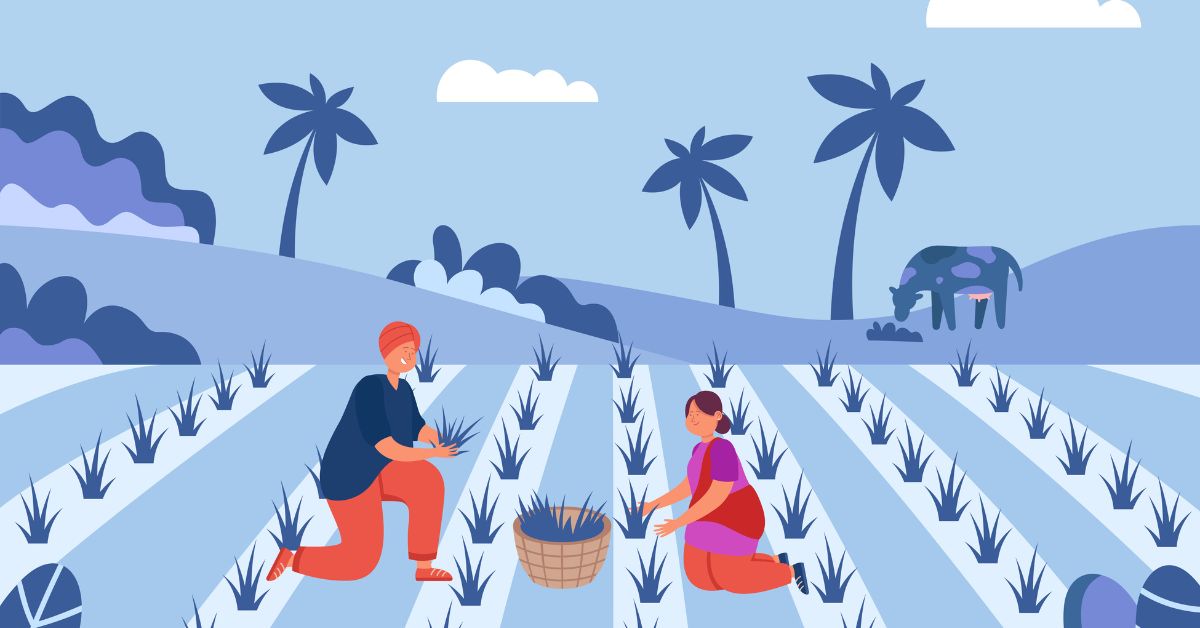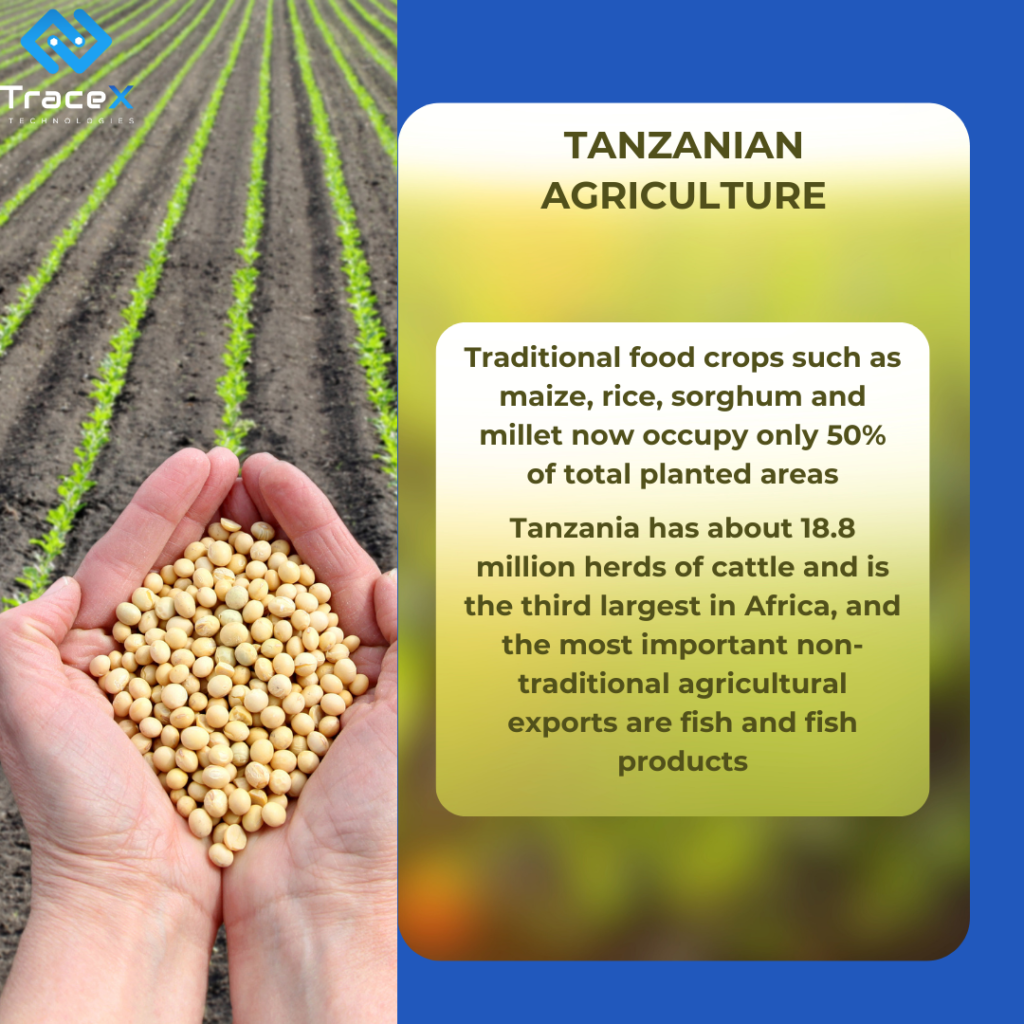Contact: +91 99725 24322 |
Menu
Menu
Quick summary: Discover the agricultural landscape of Tanzania, exploring its challenges, opportunities, and innovations. From smallholder farming to commercial agriculture, delve into the diverse practices shaping Tanzania's agricultural sector.

Nestled in the heart of East Africa, Tanzania boasts a rich agricultural landscape that has been vital to the nation’s economy and livelihoods for centuries. Agriculture in Tanzania is an important part of the country’s economy, producing a variety of crops such as maize, rice, coffee, and cashew nuts.
From the fertile plains of the Kilimanjaro region to the lush valleys of the Great Rift Valley, Tanzania’s diverse geography and favorable climate have enabled a wide array of agricultural activities to flourish. Agriculture, which benefits from favourable climatic conditions and substantial fertile land, contributes significantly to the country’s GDP and employs a big proportion of its population.
According to FAO, Agriculture accounts for approximately 28 percent of Tanzania’s GDP and provides employment the majority of the country’s population.
Tanzania has a rich agricultural diversity, including staple crops such as maize, rice, cassava, and bananas, as well as cash crops such as coffee, tea, and cotton. This diversity helps to improve food security and export potential by taking advantage of the country’s diverse agro-climatic settings.
Agriculture is essential to Tanzania’s economy, accounting for roughly 30% of GDP and employing more than 70% of the population, mainly in rural areas. This sector remains a pillar of the economy, providing jobs for millions and propelling economic progress.
Smallholder farmers are the backbone of Tanzania’s agricultural industry, growing subsistence crops and making major contributions to national food production. Large-scale commercial farming, albeit less common, plays an important role in increasing productivity, introducing new techniques, and contributing to export-oriented agriculture, notably in cash crop production and agribusiness. Balancing the interests and assistance for both smallholders and commercial farms is crucial to encouraging sustainable agricultural growth in Tanzania.

Tanzania’s government policies and agricultural development programmes have had a significant impact on the sector. Initiatives like as the Kilimo Kwanza (Agriculture First) program attempt to promote agricultural productivity through improved infrastructure, access to credit, and help for smallholder farmers. Furthermore, measures that promote land tenure stability and market liberalisation have encouraged private sector investment in agriculture.
The use of technology and digital solutions is changing Tanzania’s agricultural landscape. Farmers can use mobile phone platforms to get market information, weather predictions, and banking services. Furthermore, precision agriculture technology increase productivity and resource efficiency, whereas e-extension services provide vital agronomic assistance to rural populations.
Agribusiness entrepreneurship is booming in Tanzania, thanks to efforts to establish value chains and enhance market linkages. Investments in processing facilities and cold chain infrastructure increase the value of agricultural products, while initiatives such as Tanzania’s Southern Agricultural Growth Corridor (SAGCOT) encourage private sector investment along the value chain.
Farmer cooperatives and community-based programmes play critical roles in empowering smallholder farmers and increasing their bargaining power. These organisations promote collective marketing, input procurement, and knowledge exchange among members, resulting in better livelihoods and greater resilience to market volatility.
International collaborations and aid programmes make a substantial contribution to Tanzania’s agricultural development. Collaborations with organisations like the World Bank, FAO, and various donor agencies provide financial support, technical assistance, and capacity building to strengthen agricultural systems, promote food security, and mitigate the effects of climate change.
Explore the innovative technologies shaping the future of agriculture
Learn how smart farming practices are enhancing efficiency, productivity, and sustainability in the agricultural sector.
Tanzania’s abundance of natural resources and fertile land make it an attractive investment destination for agribusiness and value addition. With rising worldwide demand for agricultural products, there is plenty of opportunity to build processing facilities, improve infrastructure, and strengthen value chains, drawing both domestic and foreign investment.
Promoting sustainable farming techniques and conservation. Agriculture is critical to Tanzania’s agricultural sector. Initiatives focusing on soil conservation, water management, and agroforestry can increase productivity while protecting the environment for future generations, assuring long-term sustainability.
Tanzania’s agricultural potential is critical to tackling food security concerns and boosting economic growth, thereby driving the SDG2 goal. By investing in contemporary technologies, enhancing agricultural extension services, and assisting smallholder farmers, the country can boost production, alleviate poverty, and promote rural development. Smallholder farmers must be empowered through capacity building and market access to ensure inclusive growth. Providing training, finance, and market access can boost their production and income, helping to alleviate poverty and promote social stability.
Tanzania must capitalise on international commerce and export prospects in order to maximise the value of its agricultural products. By adhering to quality standards, investing in market research, and establishing trade alliances, the country can enter global markets, diversify its export base, and produce foreign exchange gains, resulting in economic prosperity.
Farm management technology solutions can play a crucial role in transforming Tanzanian agriculture by providing farmers with tools and resources to enhance productivity, sustainability, and profitability.
TraceX farm management solutions offer a comprehensive suite of tools and features designed to empower farmers with actionable insights and streamline their agricultural operations. From crop planning and monitoring to resource management and market access, the platform can provide farmers with the tools they need to enhance productivity, sustainability, and profitability. With features such as precision agriculture, crop management, resource optimization, market intelligence, and data analytics, it enables farmers to make informed decisions, optimize resource use, and maximize yields in a rapidly changing agricultural environment.
Tanzanian agriculture has enormous potential for expansion and development, thanks to favourable climate conditions, plentiful natural resources, and a sizable agricultural workforce. The sector contributes significantly to the country’s GDP and provides potential to increase production, add value, and diversify agricultural goods to fulfil domestic and international demand.
One key strategy for resolving issues and seizing possibilities in Tanzanian agriculture is to invest in infrastructure development, such as irrigation systems and rural roads, to improve access to markets and inputs. Furthermore, promoting sustainable farming methods, facilitating access to finance and technology, and strengthening agricultural extension services are critical for increasing production and resilience in the face of climate change and market fluctuations.
Collaboration and partnerships are critical to promoting Tanzanian agriculture because they enable knowledge sharing, resource mobilisation, and coordinated activities across government agencies, business sector actors, NGOs, and foreign organisations. Sustainable agricultural development in Tanzania can be achieved by encouraging multi-stakeholder cooperation, stimulating innovation, and leveraging expertise and resources, resulting in increased food security, poverty reduction, and economic growth.
Finally, Tanzania’s agricultural industry is at a critical juncture, with enormous opportunities for growth and development. Through strategic investments in infrastructure, technology, and sustainable practices, the country may leverage its natural resources and favourable environment to raise productivity, food security, and economic success for its population. Addressing issues such as climate change, market access, and low productivity necessitates coordinated efforts and new solutions, which are supported by collaboration and partnerships among diverse stakeholders. Tanzania can realise its agricultural potential, enhance livelihoods, and contribute to national and regional sustainable development goals by collaborating across sectors and adopting a single vision for agricultural transformation.

